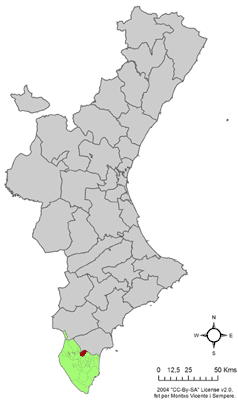Catral
| Catral | ||
|---|---|---|
| Municipality | ||
|
||
 Location Catral on the Valencian Community |
||
| Location in Spain | ||
| Coordinates: 38°09′34″N 0°48′18″W / 38.15944°N 0.80500°WCoordinates: 38°09′34″N 0°48′18″W / 38.15944°N 0.80500°W | ||
| Country |
|
|
| Autonomous community |
|
|
| Province | Alicante | |
| Comarca | Vega Baja del Segura | |
| Judicial district | Callosa de Segura | |
| Government | ||
| • Mayor | Aurelio David Albero García (2007) (PP) | |
| Area | ||
| • Total | 19.24 km2 (7.43 sq mi) | |
| Elevation | 12 m (39 ft) | |
| Population (2009) | ||
| • Total | 9,200 | |
| • Density | 480/km2 (1,200/sq mi) | |
| Demonym(s) | Catralense | |
| Time zone | CET (UTC+1) | |
| • Summer (DST) | CEST (UTC+2) | |
| Postal code | 03158; and 3349 (road to San Isidro) | |
| Dialing code | +34 (Spain) + 96 (Alicante) | |
| Official language(s) | Spanish | |
| Website | ||
Catral (Spanish pronunciation: [kaˈtɾal]) is a town in the Valencian Community, Spain. Located in the south of the province of Alicante, in the region of Vega Baja del Segura. It had 8,105 inhabitants in 2007 according to the National Statistics Institute of Spain.
Catral's origins are uncertain, as is the origin of the name. There are three theories: that the name is of Iberian origin (Kal turlthe, meaning "double peak", which would make reference tocloseCabezos of Albatera), which be of Hispanic origin (ofCastrum Altum,Villa fortified "in Latin) and Arab (Al-Qatrullät). In any case, the middle of 13th century ended the Muslim rule of Catral.
Conquered by the infant Alfonso for the Crown of Castile, he was awarded the Order of Santiago Catral sites and Callosa in 1255. However, the Castilian king reinstated the crown as in 1264. From 1296, Catral, like the southern half of the province, would go to the Crown of Aragon within the Attorney General Orihuela.
The town's farmland has increased significantly during the first two decades of the 18th century due to draining of wetlands, promoted by the Cardinal Belluga. In 1741, the 152 inhabitants of Catral paid 12,499 pounds for the title of Villa and his independence from Orihuela. In 1829, it was spared the devastating effects of an earthquake that destroyed much of the population of the region. Since then, it has held an annual thanksgiving to Saint Emigdio, patron saint against earthquakes, as a token of thanks for his intercession.
Agriculture, citrus fruits, artichokes, cereals and olive trees (cultivated in orchards that are irrigated by canals which carry water from the Segura river) produce much of the wealth together with some livestock. Growth industries include furniture, textiles, construction, food and hides.
...
Wikipedia


